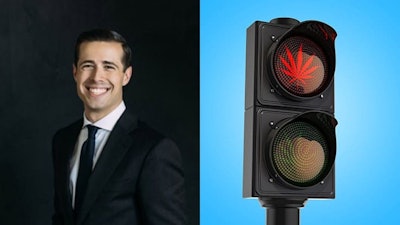
After introducing a bill that aims to end federal cannabis prohibition, U.S. Rep. Nancy Mace, R-S.C., is now the target of a new political action committee (PAC) backed by a notorious prohibitionist group’s executive.
Mace’s States Reform Act (SRA) offers a path to reform that includes a 3% federal cannabis excise tax and provides state governments the power to regulate cannabis products through the health-and-safety oversights of their choosing, while authorizing the Alcohol and Tobacco Tax and Trade Bureau (TTB) to oversee cannabis products in interstate commerce.
Although Mace’s proposed legislation is one of three high-profile bills aimed at broad federal cannabis reform introduced this Congress, it was a little too ambitious for a PAC called Protect Our Kids, which prohibitionist group Smart Approaches to Marijuana (SAM) Executive Vice President Luke Niforatos filed with the Federal Election Commission (FEC) in January.
The PAC announced March 28 it would be running digital advertising “educating Republican primary voters on Rep. Mace’s destructive policy positions,” The Post and Courier reported.
While Protect Our Kids will operate separately from SAM, the ties remain.
Formed in 2013, after Colorado and Washington voters approved adult-use legalization measures in the November 2012 election, SAM was co-founded by Kevin Sabet, a former three-time adviser for the White House’s Office of National Drug Control Policy. The organization aims to create policies that decrease cannabis use.
Tax documents filed by SAM in 2019 show the group has annual revenues in the millions.
Niforatos joined SAM in 2017 as a chief of staff and senior policy adviser, before getting promoted to executive VP in 2020.
Niforatos launched the Protect Our Kids PAC with a group of several parents who are “tired of lax drug policies that harm our kids,” according to the committee’s website.
“Thrilled to announce a project I’ve been working on quietly the past year,” Niforatos said on social media March 29. “Through partnership with more than a dozen parents and counting across the nation, I have launched a nonpartisan national super PAC. We are getting active this cycle to encourage sound drug policy.”
Protect Our Kids will funnel tens of thousands of dollars into South Carolina’s 1st Congressional District in an effort to unseat Mace, Niforatos told The Post and Courier. The PAC will also target at least six other federal and state-level races this year behind funding that exceeds $1 million, Niforatos said.
Protect Our Kids has not yet reported any donations or filed a campaign finance disclosure with the FEC, the news outlet reported.
Aubree Adams, a member of the PAC who said her son is addicted to cannabis, said on social media, “At a time where crime and drug use are at epidemic levels in this country, Nancy Mace has decided to become the Republican face of marijuana legalization.”
Other members of the committee made similar claims about their families having been negatively impacted by youth cannabis use.
Laura Stack said, “I lost my son to high-potency marijuana. That’s why I am fighting for smart drug policies.”
Sally Schindel said, “My son died by suicide and said marijuana caused it in his note. I don’t want industries making money off addicting our kids.”
Corinne Gasper said, “I lost my daughter to a stoned driver. That’s why I am asking parents everywhere to stand up and do something about the drug crisis in our country.”
While the PAC is targeting certain pro-reform politicians, it is putting its support behind state Rep. Lauren Davis, D-Wash.; state Rep. Kimberly Moser, R-Ky.; former federal prosecutor Mike Stuart, a Republican running for a state Senate seat in West Virginia; and state Rep. Yadira Caraveo, D-Colo., who is a candidate for the U.S. House.
At a time when proponents of cannabis legalization tout the plant’s medical benefits, from treating conditions like post-traumatic stress disorder (PTSD), multiple sclerosis, nausea, chronic pain and other health issues, the percentage of Americans who support policy reform remains at a record high.
According to a November 2021 Gallop Poll, 68% of Americans support full legalization of cannabis. Furthermore, 91% of U.S. adults support federal legalization of medical cannabis, according to an April 2021 survey conducted by the Pew Research Center.
Recent reform efforts, including 37 states that have legalized the commercial production and sale of medical cannabis without low-THC restrictions, as well as 18 states that have legalized adult-use, also come at a time when an estimated 40,000 people remain incarcerated for cannabis offenses, according to a 2020 Forbes report.
According to a 2020 Pew Research Center report, 40% of U.S. drug arrests in 2018 were for cannabis-related offenses.

























